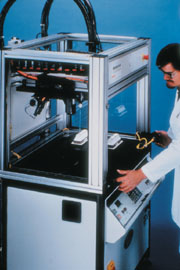
Delphi is using the Fluid Research Signature(tm) Model to dispense a two-part urethane potting compound to coat all exposed parts of the circuit-board module, as well as sealing an aluminum case to the top of the board. The airbag controller is mounted in the passenger compartment and must be able to withstand significant ambient-temperature variation and vibration, while resisting moisture, dust and other contaminants.
Manufacturing Process
In manufacturing the airbag module, Delphi has the robotically controlled dispense head programmed in a specific pattern across the device. Current production runs require the dispensing machines to deliver 32 grams of material in a 3 1/2-second shot window, while future designs will necessitate different shot sizes.
The component then proceeds on a conveyor system through a curing oven for a period of several minutes, after which it undergoes a hot functional test. This phase consists of connecting the circuit board to test equipment and elevating the temperature. The airbag module is basically a computer that requires verification that the unit is functional and all circuitry has been installed correctly.
The airbag module is a microprocessor-based controller that electronically and mechanically senses a crash event. The unit has sensors that monitor the electrical inputs to determine when the airbag should deploy. The airbag module is calibrated according to the type of vehicle in which it is installed.
Fluid Research Corp. designs and builds positive-displacement dispensing systems utilizing progressive-cavity pumps and micro-controlled servo drives to deliver accuracy and repeatability. With its broad range of shot sizes and virtually unlimited mix ratios, the equipment is precise, leak-free and cost effective.
It’s All in the Design
The Signature(tm) Series dispense system used by Delphi Delco Electronic Systems in its Kokomo, Ind., facility, is designed around a dual progressive-cavity pump system. Engineered by Fluid Research, Tustin, Calif., the true positive-displacement pumps deliver consistent pressure and flow rates, without the variation common in other volumetric dispensing systems. The progressive-cavity design eliminates many of the problems associated with piston-pump dispensing, such as pressure spikes, phasing and recharging.The Signature Series allows programming through a standard LCD panel, optional remote-operator interface, or remote-process PLC such as the one employed at Delphi Delco. Able to store up to 50 unique dispense routines to suit a wide range of manufacturing needs, it can be outfitted with integrated bar-code technology that instantly accesses the A:B ratio, shot size and flow rate for the individual part being assembled. Operators can run a variety of parts in random order on a single assembly line, and the machine will automatically configure for each part. The system has been proven successful in metering, mixing and dispensing multi-component urethanes, silicones and epoxies, including filled and abrasive materials.
The Fluid Research Stat-A-Seal(r) dispense head features a seal-free design that delivers positive flow and shutoff, adjustable snuff-back, simultaneous flow of multiple materials, center-point catalyst injection, and user-specific flow heads. Also available are integrated three-axis machines, rotary tables and indexers, all of which can be controlled by the on-board CPU to dictate positioning and dispensing requirements, or fully integrated with external automation devices.
For more information on the Signature dispensing system, contact Fluid Research Corp., 1382 Bell Ave., Tustin, CA 92780; phone 714-238-2350; fax 714-258-2352; or visit www.fluidresearch.com. Or Circle No. 207.


